One Year In: Measuring the Success of the From Micro Giving to Micro Credit project
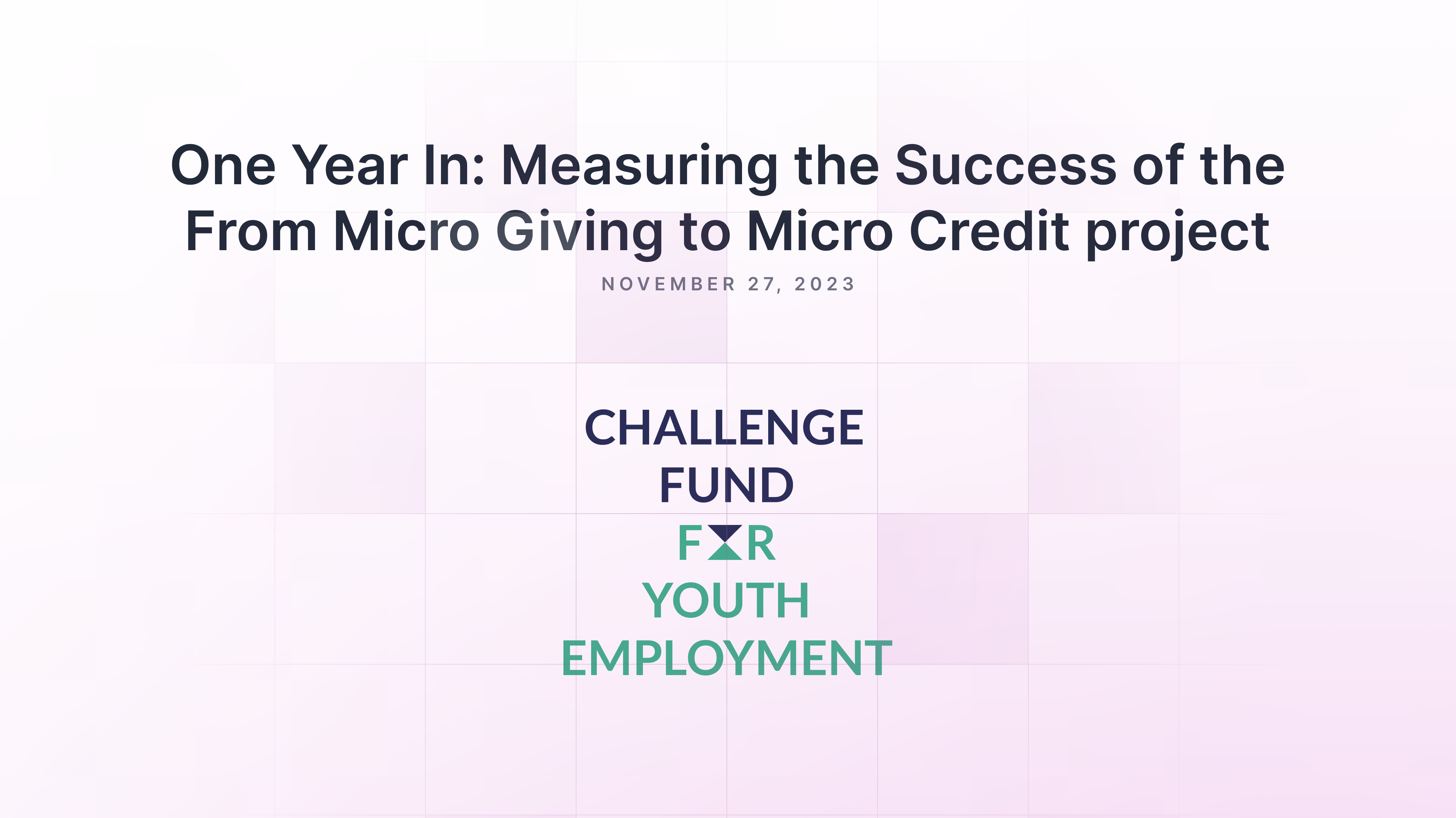
In our previous blog "From Micro giving to Micro credit: Simbuka's Role in Creating 1000+ Jobs in Uganda", we talked about a fantastic project that Simbuka started working on in August 2022. It's been a year since we began this important work, so it's a good moment to see what we've accomplished. It's worth noting that the project officially started in August of the previous year. However, right now, participants have finished only 28 weeks of the program, which is just a quarter of the total duration. The first few months were all about getting ready for the real action.
Let’s talk numbers
Funded by the Challenge Fund for Youth Employment with a strong emphasis on job creation, our project has a total target of 1,128 positions over a span of 3 years. As we mark the 28-week milestone within the program, we are delighted to witness the tangible impact of our efforts, especially in job creation. We gauge this impact through three key indicators:
| Indicator | Count |
|---|---|
| Count of young women aged 18 to 35 with increased income from their existing or new income-generating activities. | 461 |
| The count of youth (aged 18-35) experiencing an income increase lasting for a period of 45 days within six months, according to the CFYE definition, due to employment opportunities created by direct beneficiaries of the project, including indirect jobs like day laborers and boda-bodas. | 35 |
| The number of youth (aged 18-35) receiving a monthly salary from the project for providing coaching services to groups of entrepreneurs over a continuous 6-month period. | 12 |
| Total | 508 |
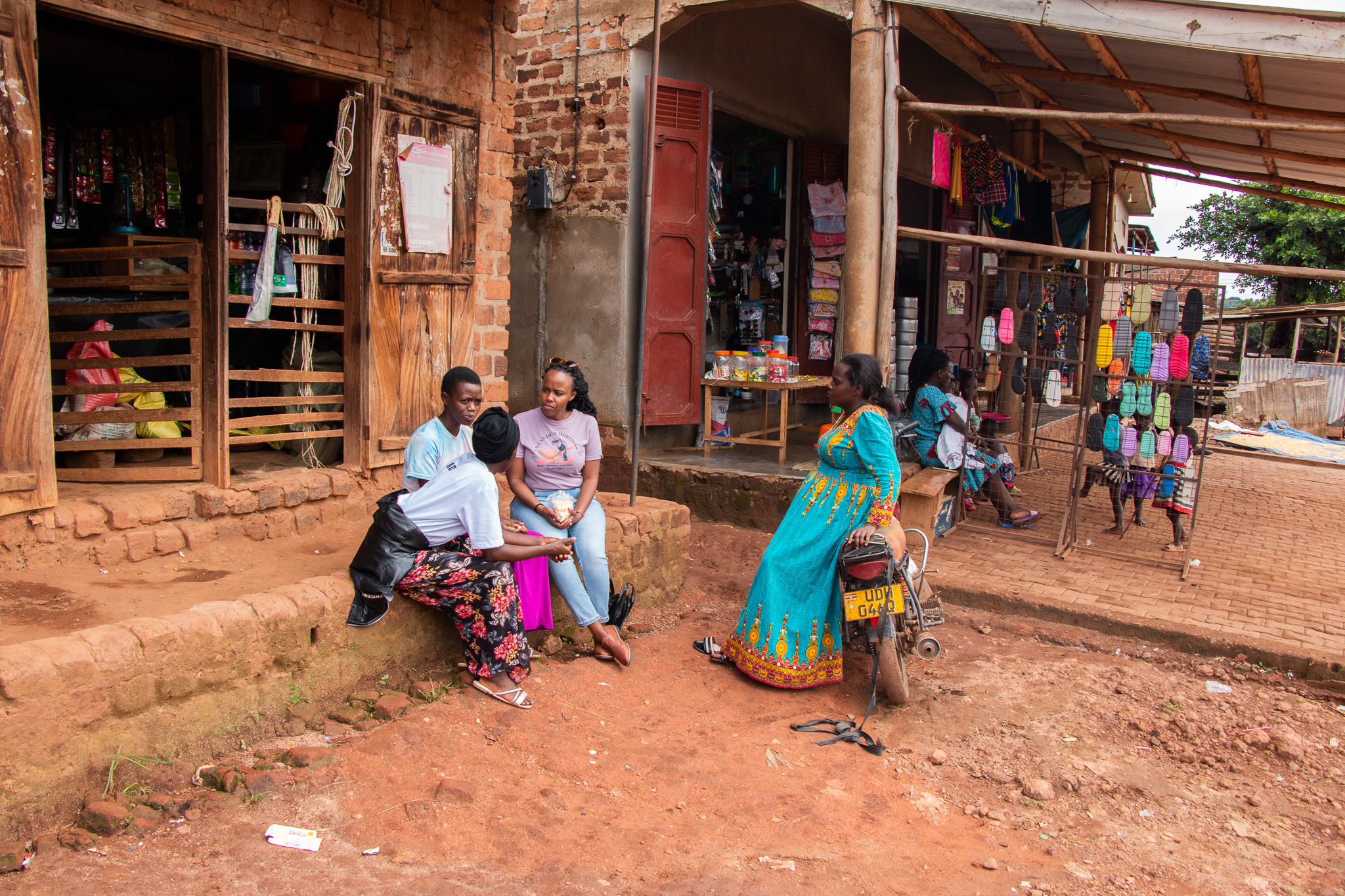
The Ripple Effect: Impacting Lives Beyond Jobs
Beyond just job matters, this project has improved various important aspects of life. For example:
- Access to clean water has increased by 20% since the project began.
- People now enjoy 65% more daily food access, a significant jump from the 14% that was measured during the baseline study 28 weeks ago.
- Investments have surged by an impressive 76%, with funds wisely directed into education, machinery, tools, land, and farming.
- The number of women who often feel reasonably happy considering everything jumped from 34% to 56%.
- The number of women who never lose sleep because of worries increased from 17% to 47%.
- The number of women who never feel like they lost confidence surged from 33% to 83%.
Please note that all detailed results can be found at the end of the article. Don't miss out on the comprehensive insights and data. For further information about the project and Simbuka’s role in it, visit this link.
A Year of Transformation: Voices from the Field
Offering financial help to communities is not new but helping them to effectively and relevantly ably use this money to build tangible family assets, start sustainable business, and have a long-term assured positive economic livelihood is worth celebrating. It's almost unbelievable that all these young women can have a 360-degree turn-around of their social and economic lives in such a very short time, but it is happening, and this is indeed a testament to the amazing work that Simbuka and 100WEEKS are doing. We are happy to be part of such an initiative and look forward to continued collaboration. Support a woman, build a nation.
Andrew Magunda
Country Lead of Challenge Fund for Youth Employment Uganda
In our work to improve access to finance, I take particular pride in the project we've developed. It systematically uplifts underserved and unbanked women, connecting them with financial institutions and ultimately closing the gap between the supply and demand for finance. This is an important topic that requires a holistic approach. The results we've achieved highlight the transformative power of the approach, from micro-giving to micro-credit. I believe these results can serve as a foundation for further progress.
I want to extend my appreciation to all the consortium members who have brought their expertise and experience to create a project that harnesses all our strengths. Only by working together can we make a lasting impact.
But let's remember, the true heroes are the women in the program who work tirelessly every day to realize their potential and make a positive impact on those around them.
Paul Weiss
Head of Growth at Simbuka, Overall Project Manager of the Project
As 100WEEKS, it was the first time to engage in a project like this one, which made us very proud and excited. Our organization has been proving its potential and reliability over the last years and this project gave us the chance to further showcase this. Now, one year into the program, I can proudly say that the program gave us results that were beyond even our expectations. Looking at the direct impact of the program on the lives of the participants, we see very positive results and a lot of promising initiatives and businesses. But beyond this, the particular focus on jobs that this project has not only give the women a bigger sense of direction, but it also helps 100WEEKS in its development towards a more complete development instrument. For this, I would like to thank all our partners in this project, with special thanks to the Challenge Fund, Simbuka, and the Rabo Foundation. This project does not only support female youth to create a good and sustainable life for themselves, on their own terms, but it also potentially steers the international development world towards a more innovative, efficient, and data-driven way of poverty alleviation and sustainable development. Therefore, we are looking forward to continuing job creation programs like this successful endeavor in the future.
Jurrian Veldhuizen
Project Manager at 100WEEKS, Project Manager of the 100WEEKS Program for the Project
The youth that are part of this project are very vibrant and eager to learn and to take on new businesses. Their lack of prior experience can be an advantage because they're open to new ideas and approaches. It's truly inspiring to witness these women taking control of their futures. Our 100WEEKS program is making a real difference in their lives by empowering them to create a positive impact.
Catherine Tabingwa
Senior Program Manager at 100WEEKS, Project Manager of the 100WEEKS Program for the Project
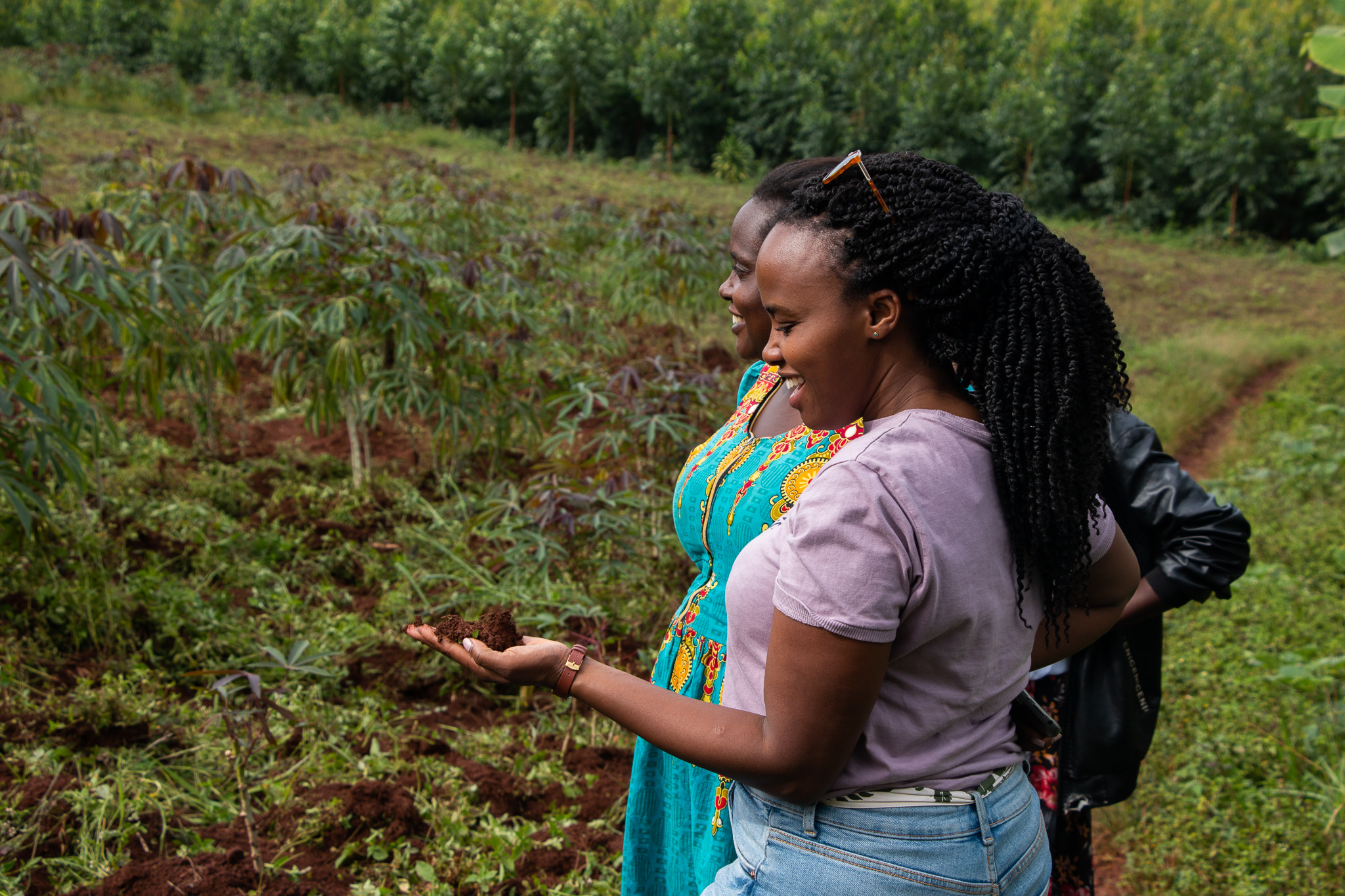
One year results
Quantifying certain aspects of life, such as overall quality of life and happiness, poses inherent challenges. In order to tackle this issue, all project participants undergo multiple interviews throughout the program's duration. The questionnaire encompasses inquiries about the participant's well-being, food security, social capital, financial status, and more. A baseline study was conducted prior to the program's initiation to establish a reference point for measuring its impact. Subsequently, an additional round of interviews has been conducted to assess the effects of the program's initial 28 weeks. The baseline study results are depicted in the graphs labeled as 0, while the recent interview round results are labeled as 1 and the difference between them is the realized impact. Further interview rounds are scheduled to follow.
Access to clean water
The United Nations has affirmed that the availability of clean water is a fundamental human right, integral to overall well-being. Regrettably, not all participants in our program initially had access to clean water. However, within the initial 28 weeks, there has been a significant advancement, with access to clean water increasing from 71% to 91%, marking a noteworthy achievement.
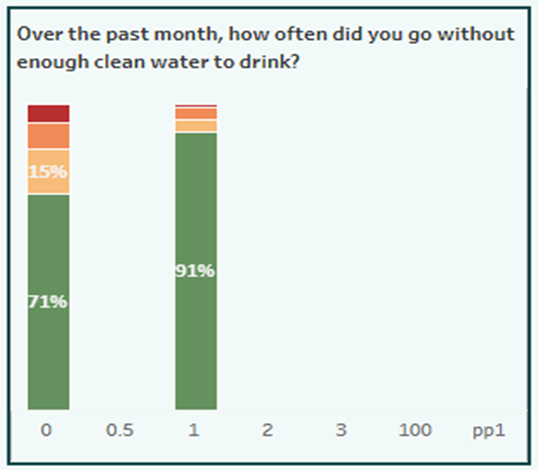
Food security and mental health
Inadequate food intake can exert notable impacts on mental health, resulting in stress, sleep disturbances, and feelings of sadness. At the program's onset, merely 14% of participants had access to enough food for an entire month, averaging 2.1 meals per day. After 28 weeks, this situation improved significantly, with 65% of participants now having sufficient food for an entire month and an average daily meal count of 2.5.

We recognize that a shortage of economic resources and food security can significantly influence happiness and the ability to sleep well at night. Consequently, our initial observations revealed that only 34% of the participants initially regarded themselves as happy, and merely 17% could enjoy a worry-free night's sleep for an entire week. Encouragingly, these figures have seen a substantial uptick, now standing at 22% and 30%, respectively.
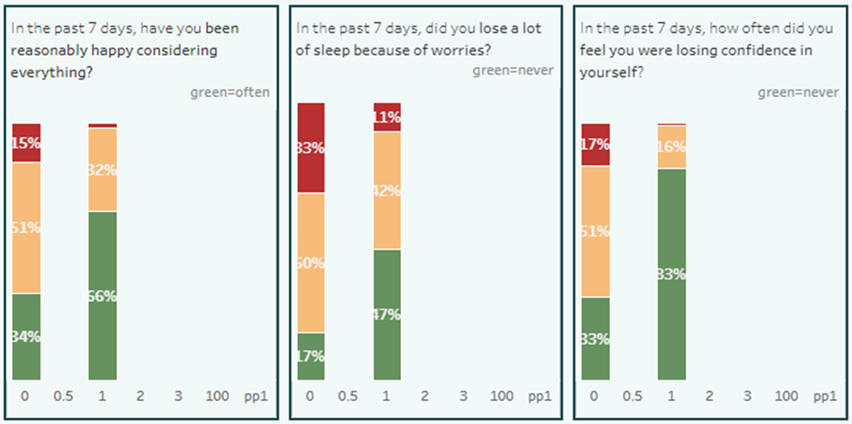
Social capital
Social capital, denoting the standing individuals maintain within their community, is evidently a valuable asset. Notably, it has experienced a positive impact. There is an 8% rise in the number of individuals being invited to celebrations, a 10% increase in seeking advice and assistance from others, and a 6% upturn in trust, particularly concerning the care of their children.
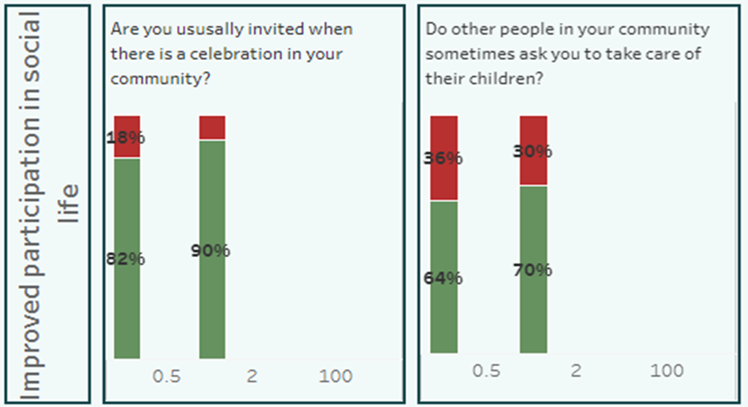
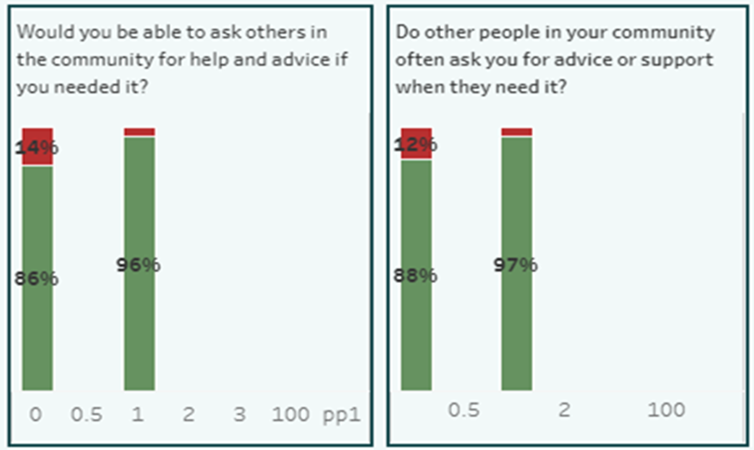
Income and assets
Income and assets are crucial aspects, and we take pride in noting a significant improvement. The monthly savings of participants have nearly tripled, escalating from 57,946 UGX (13.83 EUR) to an impressive 147,723 UGX (35.28 EUR). Furthermore, in terms of livestock, particularly poultry, there has been a remarkable increase, soaring from 793 per household to an impressive 2,069.
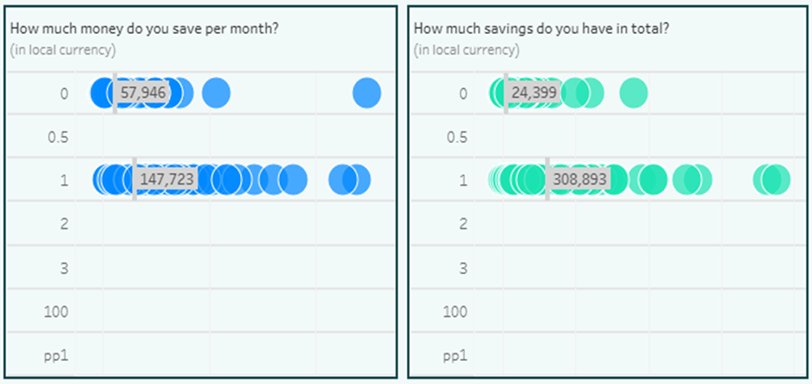
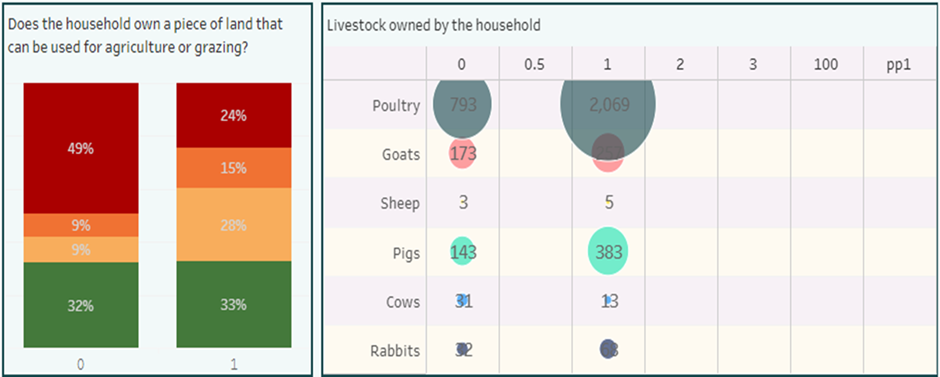
Invested in
Finally, but certainly not less important, the participants' capacity to invest has increased by 76%. Notably, they are directing their investments towards goods or aspects that promise future benefits, including education, livestock, farming, and tools and machinery.
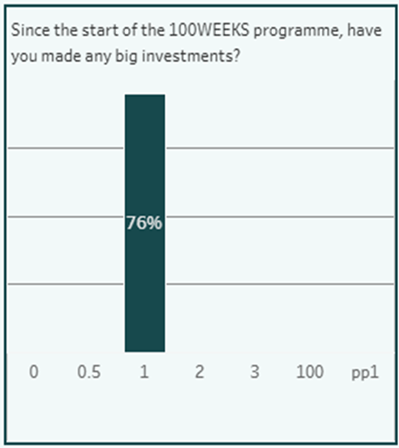
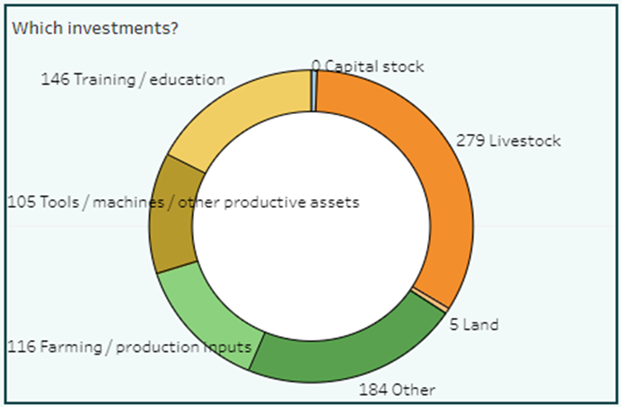
These are just some of the tangible improvements that underscore the transformative impact of the program, showcasing its effectiveness in enhancing various facets of the participants' lives. The journey from micro-giving to micro-credit has not only uplifted economic conditions but has also fostered happiness, strengthened social bonds, and paved the way for a more promising and sustainable future for the individuals involved.
Reference: The surveys were done by 100WEEKS.
Try and experience the impact yourself
The Next-Generation Loan Management Platform streamlining loan processes like never before. Dive in and see the difference firsthand!